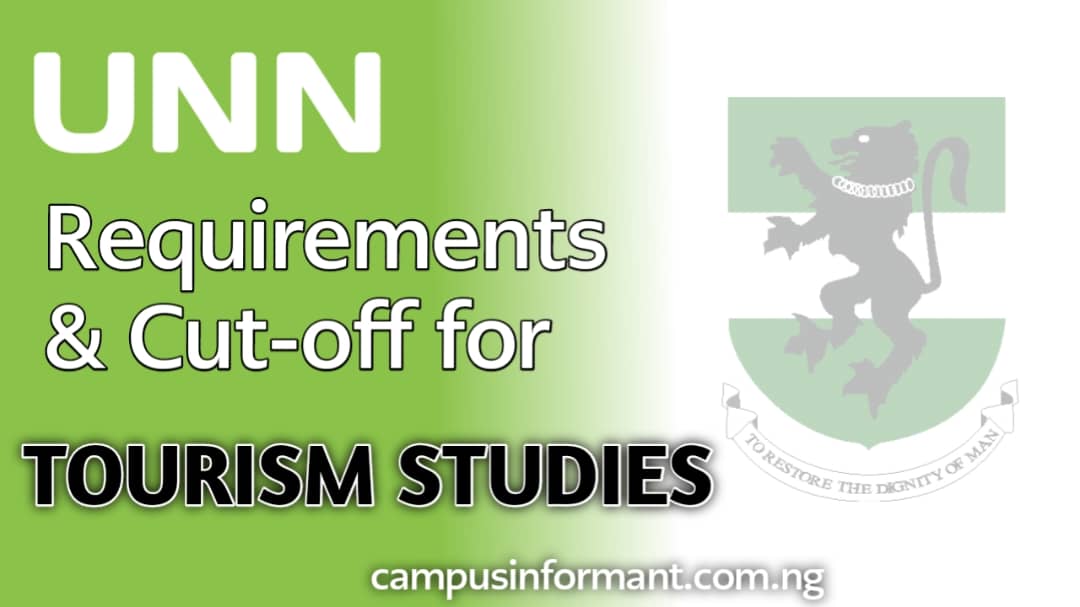UNN Requirements & Cut-Off Mark for Tourism Studies 2025/2026: Are you considering studying Tourism Studies at the University of Nigeria, Nsukka (UNN)? This guide provides detailed information about the program, including admission requirements, cut-off marks, JAMB subject combinations, O’Level requirements, and Direct Entry qualifications.
We will also highlight career opportunities, tips to improve your chances of admission, and alternative courses if you do not meet the requirements.
Stay UPDATED with the Latest INFORMATION and GIST about your preferred school on WhatsApp. CLICK HERE TO JOIN NOW!
Overview of Tourism Studies at UNN
The Tourism Studies program at the University of Nigeria, Nsukka (UNN) focuses on the study of the tourism industry, including hospitality management, travel planning, cultural heritage tourism, and sustainable tourism development. The program combines classroom learning with practical experiences such as field trips, tourism marketing strategies, and event management.
UNN offers this program at its Nsukka campus, providing students with the knowledge and skills required to thrive in the tourism and hospitality industry.
Admission Requirements for Tourism Studies at UNN
Below are the requirements for students applying for the Tourism Studies program at UNN.
UTME Requirements for Tourism Studies at UNN
Candidates must meet the following criteria to study Tourism Studies at UNN:
A minimum JAMB score of 160 or above
JAMB Subject Combination for Tourism Studies at UNN
UNN requires the following subjects for Tourism Studies:
- English Language (Compulsory)
- Geography or Economics
- Any two other subjects from Arts or Social Sciences
O’Level Requirements for Tourism Studies at UNN
To gain admission into UNN, candidates must have at least five credit passes in their O’Level results (WAEC, NECO, or NABTEB), including:
- English Language
- Mathematics
- Geography or Economics
- Any two other relevant subjects from Arts or Social Sciences
Results must be obtained in not more than two sittings.
Post-UTME Screening Requirements for Tourism Studies at UNN
Candidates who meet the JAMB cut-off mark must participate in the UNN Post-UTME screening. The screening may include written tests and an assessment of the candidate’s knowledge in tourism, travel management, and hospitality. Performing well in this screening significantly boosts your chances of admission.
Direct Entry Requirements at UNN
Direct Entry candidates must meet any of the following criteria to qualify for admission into UNN:
- Two A-Level passes in Geography, Economics, or any other related subject
- A National Diploma (ND) or National Certificate of Education (NCE) in Hospitality Management, Tourism, or any related field with Merit or Credit
- Candidates must also meet the O’Level requirements
Check the official UNN website for more details.
UNN Cut-Off Marks for 2025/2026
UNN has set a general cut-off mark of 160 for the 2025/2026 academic session. This means that candidates who score 160 and above in JAMB UTME can apply for admission.
Departmental Cut-Off Mark for Tourism Studies at UNN
The specific departmental cut-off mark for Tourism Studies at UNN is typically 160 or above. However, since UNN does not publicly release departmental cut-off marks, aiming for a high JAMB and Post-UTME score is advisable.
How to Calculate UNN Post-UTME Screening for 2025/2026
The aggregate score for last year was calculated using this formula:
Aggregate = 90% of JAMB score + 10% of Post-UTME score (PUTME)
Or:
(0.9 × JAMB Score) + (0.1 × PUTME Score)
To calculate your UNN Post-UTME score:
O’Level Results (WAEC, NECO, NABTEB)
Grade to Points Conversion:
- A1 = 90
- B2 = 80
- B3 = 70
- C4 = 60
- C5 = 50
- C6 = 40
- D7 to F9 = 0
For one sitting (using only one result), add 40 extra points.
Example calculation:
If a student has the following O-Level results:
- English Language: B3 = 70
- Geography: A1 = 90
- Economics: B3 = 70
- Mathematics: C5 = 50
(Single sitting) and scores 296 in JAMB, the calculation would be:
70 + 90 + 70 + 50 = 280
Add 40 points for one sitting: 280 + 40 = 320/400
PUTME Score = 320
JAMB Score = 296
Determine the UNN Final Aggregate Score
Aggregate = (90% of 296) + (10% of 320)
= (0.9 × 296) + (0.1 × 320)
= 266.4 + 32
= 298.4
Tuition and School Fees for Tourism Studies at UNN
The estimated tuition fees for Tourism Studies at UNN are:
- 100 Level: ₦110,800
- 200 Level: ₦95,150
- 300 Level: ₦74,000
- 400 Level: ₦70,500
Fees may vary slightly, so always confirm with the UNN official website.
Recommended Links/Articles
- UNN UNEC Campus Hostel Portal 2024/2025: How to Apply for Accommodation
- List of Courses Offered in the University of Nigeria, Nsukka (UNN)
- UNN Admission List Is Out (Updated)
- UNN & UNEC Departmental Uniform Dress Code 2024 (Updated)
Alternative Courses for UNN Tourism Studies
If you do not meet the cut-off mark for Tourism Studies at UNN, you can consider these related programs:
- Combined Arts
- Archaeology and Heritage Studies
- History and International Studies
These courses also focus on tourism, business management, and cultural studies.
Career Opportunities for Tourism Studies Graduates from UNN
Graduates of Tourism Studies from UNN can explore diverse career opportunities, including:
- Travel and Tour Management
- Hotel and Hospitality Industry
- Event and Conference Planning
- Cultural and Heritage Tourism
- Airline and Cruise Line Services
- Tourism Policy and Development
UNN provides students with a blend of theoretical knowledge and practical experience, making them valuable in the tourism and hospitality sector.
Final Note
Studying Tourism Studies at UNN is an exciting and rewarding journey. To improve your chances of admission:
- Aim for a JAMB score above 170 to 220
- Prepare thoroughly for the Post-UTME screening
- Stay updated with official announcements from the UNN website
If you found this guide helpful, share it with others. Best of luck in your academic journey!

